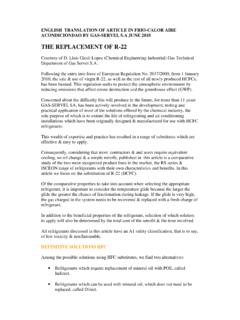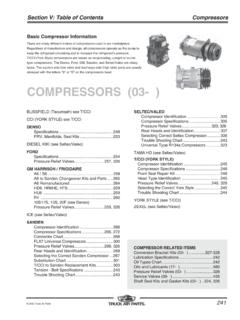Transcription of CHRISTOFFEL JOHANNES VAN DIJK J U D G M E N T KOEN J …
1 SAFLII Note: Certain personal/private details of parties or witnesses have been redacted from this document in compliance with the law and SAFLII Policy IN THE HIGH COURT OF SOUTH AFRICA KWAZULU-NATAL DIVISION, PIETERMARITZBURG CASE NO. AR 245/13 In the matter between: MARY- ANNE VAN dijk (VINCENT) Appellant And CHRISTOFFEL JOHANNES VAN dijk Respondent _____ J U D G M E N T _____ KOEN J: INTRODUCTION: [1] This is an appeal against an order of the maintenance court refusing the authorisation of the issue of a warrant of execution in respect of the Respondent s failure to meet certain maintenance obligations due by him.
2 BACKGROUND: 2 [2] On the 9 January 20131 an order2 was granted by the maintenance court in Pietermaritzburg directing the Respondent: (a) to pay maintenance in the sum of R3 per month per child in respect of the minor children M a girl born on 14 October 1995, J a girl born on 22 June 1998 and C a girl born on 13 December 1999; (b) to pay the boarding fees in respect of M and J for 2012; (c) to pay the boarding fees for the three minor children; (d) to pay the school fees in respect of the three minor children; (e) to reimburse the Appellant for premiums for the membership of the minor children on her Medical Scheme on the Emerald participation level; (f) to pay alternatively reimburse the Appellant in respect of all reasonable educational costs over and above the school fees; (g) to pay the Conserta medication in respect of Calsey.
3 [3] On 4 February 2013 the Appellant applied ex parte to the maintenance court in terms of s 26 and 27 of the Act3 for authorisation for the issue of a warrant of execution in the sum of R19 Ex facie the affidavit in support of that application, the Respondent allegedly failed to pay: (a) the maintenance in respect of January 20134 and February 20135, in that he paid an amount of R9 , leaving a shortfall of R11 538 in arrears; (b) the boarding fees in respect of the three minor children, in that he paid an amount of R12 , leaving a balance of R6 in arrears; (c) the educational costs in the sum of R2 1 The judgment of the court a quo wrongly refers to the order in respect of which the authorisation of the warrant of execution was sought as being one dated 21 December 2012.
4 2 The maintenance order was one made in terms of section 16 of te Maintenance Act 1998 against the Respondent, as a person legally liable to maintain his three minor children, in substitution of an earlier maintenance order of the 21 of December 2012 which was in force, or in substitution of other earlier maintenance orders which were previously in force, as contemplated in s16 of the Maintenance Act 99 of 1998 (hereinafter referred to as the Act ). 3 The Maintenance Act 99 of 1998. 4 He had paid R4 232,00. 5 He had paid R5 3 [4] It is common cause that when the application was argued before the court a quo6, an appeal had already been noted by the Respondent against the maintenance order7 on which the application for authorisation was based.
5 THE JUDGMENT OF THE COURT A QUO: [5] The court a quo concluded that the maintenance order in respect of which the authorisation of the issue of a warrant of execution was sought, was one contemplated in s 16(2) of the Act. Referring to s 26(3)8 of the Act, which provides for enforcing a maintenance order by applying for authorisation for the issue of a warrant of execution but which contains no reference to s 16(2) and only refers to orders in terms of s 16 (1), the court concluded that it did not have the power to authorise the issue of the warrant of execution.
6 It accordingly refused the application. [6] S 16(2) of the Act provides: (a) Any court (i) that has at any time, whether before or after the commencement of this Act, made a maintenance order under subsection (1)(a)(i) or (b) (i); (ii) that makes such a maintenance order; or (iii) that convicts any person of an offence referred to in section 31 (1), shall subject to paragraph (b)(i), make an order directing any person, including any administrator of a pension fund, who is obliged under any contract to pay any sums of money on a periodical basis to the person against whom the maintenance order in question has been or is made.
7 To make on behalf of the latter person such periodical payments from moneys at present or in future owing or accruing to the latter person as may be required to be made in accordance with that maintenance order if that court is satisfied - 6 According to the Respondent s heads of argument the Appellant subsequently brought successful applications for the authorisation of the issue of warrants of execution against the Respondent, namely during August 2013 for an amount of R23 , which was met when the warrant was served, and 16 October 2013 in respect of which an application brought by the Respondent to have the warrant set aside, is pending.
8 7 Pars of which have been quoted in paragraph 2 above. 8 Quoted in paragraph [17] below. 4 (aa) in the case of subparagraph (1), after hearing such evidence, either in writing or orally, as that court may consider necessary; (bb) in the case of subparagraph (ii), after referring to the evidence adduced at the enquiry or the application for an order by default, as the case may be; or (cc) in the case of subparagraph (iii), after referring to the evidence at the trial , that it is not impracticable in the circumstances of the case. (b) A court (i) contemplated in paragraph (a)(i) shall only make an order referred to in paragraph (a) on application; and (ii) that convicts any person of an offence referred to in section 31(1) shall make such order whether or not any penalty is imposed in respect of that offence or any order is made under section 40 (1).
9 [7] The maintenance order in respect of which the authorisation of the issue of a warrant was sought, was clearly not one for periodical payments contemplated in s 16(2). This much was also common cause between the parties on appeal. Indeed the order sought to be enforced was one in terms of s 16(1)(b)(i)9 of the Act being a maintenance order contemplated in s 16(1)(a)(i) made in substitution of an existing maintenance order which was in force. The court a quo accordingly erred in concluding that the case before it was one in terms of s 16(2) which precluded the authorisation of the issue of a warrant of execution in terms of s 26(3)(b) of the Act.
10 [8] It follows that if that order is appealable, the decision of the court falls to be set aside. If set aside, an appeal court would in the ordinary course substitute for the order set aside such order as should have been granted. [9] On the arguments raised in this appeal, the main issues arising for consideration are: (a) accepting that the refusal of the application for authorisation by the court a quo was wrong, whether that decision is appealable; (b) if appealable, what order should properly have been granted by the court a quo.
















